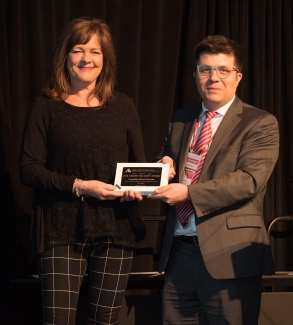On June 5, Canadian Blood Services was honoured to accept the Canadian Operational Research Society's Omandt Solandt Award at a reception in Halifax, Nova Scotia. Michelle Rogerson, Director, Supply Chain (Atlantic), Canadian Blood Services, accepted the award on behalf of the organization.

About this award
Dr. Omand McKillop Solandt was the first president of the Canadian Operational Research Society. He was a physician and surgeon, who graduated from the University of Toronto and did post-graduate work at Cambridge in the 1930s. When the Second World War broke out, Dr. Solandt investigated the fighting conditions in armoured vehicles. His early work lead to the discovery that exhaust from the main gun feeding back into the tank caused crew members to lose consciousness.
Solandt was instrumental in the founding of Operational Research and he became Superintendent of the British Army Operational Group in 1944. Following the war, he became Director General of Operational Research in Canada and founding chair of the Defence Research Board. Dr. Solandt later worked for Canadian National, de Havilland Aircraft, and the Canadian Geographical Society. Awarding the Solandt prize to Canadian Blood Services is particularly apropos, since Dr. Solandt’s career began as a blood banker.
Delivering blood products to Canadians efficiently and effectively is a key element of Canadian Blood Services’ mandate. As part of our day-to-day business and, through our support of research, Canadian Blood Services is both a practitioner and creator of operational research.
As described in the award citation, Canadian Blood Services has a cadre of industrial engineers working in areas such as supply chain and donor services to increase donor satisfaction and retention, develop innovative production methods, and create seamless, integrated delivery networks. A recent, remarkable pairing between Canadian Blood Services and Toyota Canada saw the application of operational research and industrial engineering methodologies while rolling out lean production techniques in the organization’s Brampton production centre.
We have also supported the development of new operational research knowledge through applied research conducted with researchers such as Dr. John Blake at Dalhousie University. Canadian Blood Services has used operational research, developed in house, to bring evidence-based decisions to complex and contentious issues such as consolidating regional production centres or determining the optimal ethnic composition of the nation’s adult stem cell donor registry.
We are proud to be recognized for the application of operational research and continued development of new operational research knowledge through the 2018 Omand Solandt Award.
Canadian Blood Services – Driving world-class innovation
Through discovery, development and applied research, Canadian Blood Services drives world-class innovation in blood transfusion, cellular therapy and transplantation—bringing clarity and insight to an increasingly complex healthcare future. Our dedicated research team and extended network of partners engage in exploratory and applied research to create new knowledge, inform and enhance best practices, contribute to the development of new services and technologies, and build capacity through training and collaboration. Find out more about our research impact.
The opinions reflected in this post are those of the author and do not necessarily reflect the opinions of Canadian Blood Services nor do they reflect the views of Health Canada or any other funding agency.
Related blog posts
Alana Cattapan, assistant professor in the Johnson Shoyama Graduate School of Public Policy (JSGS) at the University of Saskatchewan (U of S) has been awarded the Canadian Blood Services’ James Kreppner Award ($43,275) to study the issues related to the commercialization of blood and tissue in...
